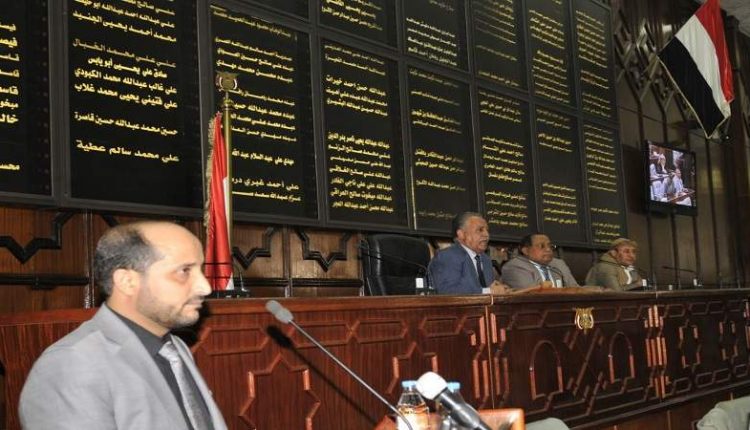Yemeni Parliament Condemns Detaining Oil Tankers by US-Saudi Aggression
The Yemeni Parliament condemned, on Sunday, the continuation of detaining oil tankers by US-Saudi aggression, considering this a circumvention of the terms of the UN-sponsored truce. The members of the Parliament called on the Security Council and the United Nations to compel the countries of the aggression coalition to supply crude oil revenues to Yemeni banks, as well as support hospitals, pay the salaries of all state employees and improve services.
They held the United Nations fully responsible for the transfer of the Central Bank to Aden and the resulting repercussions and exacerbation of the humanitarian situation and increased suffering of the Yemeni people, as well as the catastrophic effects of the aggression and siege for more than seven years.
They also called on the Security Council and the UN to obligate the countries of the coalition of aggression to supply crude oil revenues to Yemeni banks and work to restart the Aden and Safer refineries to alleviate the suffering of the Yemeni people, as well as support hospitals, and pay the salaries of all state employees, in addition to improving services, subsidizing electricity, and providing necessary services to all Yemeni governorates. The Parliament stressed the importance of adhering to the implementation of the truce’s terms and working to end all difficulties and obstacles created by the coalition of aggression.
On Saturday, Yemen Petroleum Company (YPC) announced that the US-Saudi aggression continued to seize oil ship with a total tonnage of 23,920 tons of gasoline, for 10 days.
In a statement the company stated, Saturday, that the seized ship had completed all examination and audit procedures and had obtained UN permits.
Despite the ongoing UN-sponsored truce, the coalition of aggression continues its piracy, detaining fuel ships, and preventing them from entering the port of Hodeidah, despite having undergone inspection and received UN clearance.
This violation aggravates the humanitarian catastrophe due to the suspension of many vital service sectors, especially hospitals, electricity, water, cargo trucks, as well as waste trucks.
In early April, after Yemen’s Supreme Political Council declared a voluntary and unilateral three-day pause in retaliatory strikes against targets in Saudi Arabia, the UN special envoy for Yemen, Hans Grundberg, announced the nationwide ceasefire, for the first time since 2016.
The deal stipulates halting offensive military operations, including cross-border attacks, and allowing fuel-laden ships to enter Yemen’s lifeline al-Hudaydah port and commercial flights in and out of the airport in the capital Sana’a “to predetermined destinations in the region .”
However, in light of UN silence, the Saudi-led aggression was still obstructing flights to the Sana’a International Airport in Yemen’s capital and detaining fuel ships that were headed to the country. The fires of the aggression side did not subside along the fronts, on the borders and inside, including shelling, reconnaissance, development and crawl.
In early June, the United Nations announced that Yemen’s National Salvation Government and the US-Saudi coalition have agreed to renew the two-month truce after days of negotiations and promises to fulfill the terms of the agreement.
The UN envoy noted that the truce was extended under the same terms as the previous one.
The United Nations continues to condone the crimes committed by the Saudi-led aggression. It only holds the coalition responsible for crimes when it seeks to blackmail the Kingdom and oblige it to pay millions of dollars. The UN is not concerned with the souls of the victims, as it provided cover for this aggression for years, and kept silent in the face of many of its criminal practices, whether through raids or sieges.
Since June 2020, the aggression and its allied government have continued to prevent fuel ships from entering the port of Hodeidah, except for a few ships that entered the port with a large time difference between each ship. Most of the ships left the place where they were being held by the forces of aggression, with their full cargo, after accumulating delay fines, exceeding the price of the cargo.
A suffocating fuel crisis in all governorates is experienced under the authority of Sana’a. Most of the important vital sectors, especially the health sector, are threatened with suspension, while work has been disrupted in many productive and service sectors, which caused economic losses of millions of dollars.

